I know I keep posting stuff that isn't written by me, but I think this is interesting, so I want to share.
Observations from a visit to China
By Sheila Brehm
2 June 1998
 China presents the visitor with a study in contrasts. Modernity and backwardness clash and mix in a thousand ways. The country still shrouded in mystery and intrigue fascinated me. From the austere political center of Beijing to the burgeoning "free market" glitter of Shanghai, I was struck by the vast contradictions of present-day life in China.
China presents the visitor with a study in contrasts. Modernity and backwardness clash and mix in a thousand ways. The country still shrouded in mystery and intrigue fascinated me. From the austere political center of Beijing to the burgeoning "free market" glitter of Shanghai, I was struck by the vast contradictions of present-day life in China.
The most populous country in the world, China is home to more than one-fifth of the human race. Chinese society is riven by enormous social contradictions that give lie to the meaningless and ahistorical litany of the bourgeois media that China is "communist" or "socialist." The thread that runs through every aspect of life--from housing, health care, education, transportation and entertainment--is the existence of backwardness, primitiveness and poverty alongside the concentrations of wealth which have emerged with the development of the market economy.
The vast majority of China's people are peasants. An estimated 80 percent of the population work the land, harvesting grains, cotton, sugar, tobacco, tea, fruits and vegetables. The peasants have a hard life; many families live without indoor plumbing, heat or electricity. The gap is growing in the standard of living between urban and rural China. The average income in the cities has always exceeded that in the countryside, but today it is widening. I spoke to university students who explained that the difference between rural and urban incomes used to matter very little since country people were only dimly aware of living conditions in the cities, and even if they knew that life was better there, they were prevented by the government from moving. This is no longer the case today.
 According to government statistics, 150 million peasants are considered to be "surplus" labor. The stream from the countryside to the urban centers has become a flood. More than 100 million workers have come from the countryside into China's cities in search of more lucrative work. These workers are hired on a short-term basis, most frequently as day laborers in construction. Because they are not officially residents of the cities they are living in, they are not entitled to housing or social services. They tend to camp out wherever they can find shelter. The government officials look upon them as a dangerous necessity--a source of cheap labor but also the source of future political unrest.
According to government statistics, 150 million peasants are considered to be "surplus" labor. The stream from the countryside to the urban centers has become a flood. More than 100 million workers have come from the countryside into China's cities in search of more lucrative work. These workers are hired on a short-term basis, most frequently as day laborers in construction. Because they are not officially residents of the cities they are living in, they are not entitled to housing or social services. They tend to camp out wherever they can find shelter. The government officials look upon them as a dangerous necessity--a source of cheap labor but also the source of future political unrest.
As I saw some of the conditions on the construction sites in Beijing I could not help but wonder if these workers, who appeared to be unskilled, had come from the countryside. Student dormitories at one of the universities were being torn down and rebuilt literally brick by brick. I watched workers without hard hats or boots knocking off bricks from rather dilapidated buildings. Other workers sat for hours hammering the bricks apart so they could be loaded up by hand on a flatbed truck pulled by mules so these materials could be used at another construction site. It was not uncommon at the end of the day to see the workers stretched out on top of the flatbeds totally exhausted.
 In contrast, there are massive construction sites in downtown Beijing and Shanghai where spectacular luxury hotels and office buildings are mushrooming. It is common to see laborers as late as eleven o'clock at night working on the construction sites. Most of this construction is organized through joint venture projects. The materials and equipment used on these sites, not to mention the finished structures, appear technologically far superior to that used for housing the majority of the populace. The opulence of the five-star Great Wall Hotel in Beijing owned by Sheraton stands in sharp contrast to the conditions of most working people, including professional workers such as university professors. The restroom area, furnished with elegant couches and chairs, was larger and nicer than the living space of many millions.
In contrast, there are massive construction sites in downtown Beijing and Shanghai where spectacular luxury hotels and office buildings are mushrooming. It is common to see laborers as late as eleven o'clock at night working on the construction sites. Most of this construction is organized through joint venture projects. The materials and equipment used on these sites, not to mention the finished structures, appear technologically far superior to that used for housing the majority of the populace. The opulence of the five-star Great Wall Hotel in Beijing owned by Sheraton stands in sharp contrast to the conditions of most working people, including professional workers such as university professors. The restroom area, furnished with elegant couches and chairs, was larger and nicer than the living space of many millions.
To a traveler, an ordinary street in Beijing is a striking scene, which brings together many aspects of Chinese society. Bicycles predominate as the main mode of transportation. Men and women, young and old, all expertly navigate through the crowded, noisy and polluted streets, weaving between people on foot, pedabikes, taxis, minibuses, double buses, and horse-drawn flatbeds as well as the growing numbers of Mercedes for the businessmen and government officials. No one pays any attention to the traffic lights or lanes, so the experience can be a little overwhelming if not terrifying.
We used the minibuses the most as they were less crowded than the full-sized buses. Every minibus has two employees, the driver as well as another worker who stands at the side doors shouting the destinations of the bus and collecting the money. The fares are the US equivalent of 25 to 50 cents. Almost miraculously, 17 people can be crammed into these vehicles. There is not a seat belt to be found. Very often, the vehicle leaves the route, unannounced, in order to fuel up. These vehicles are old and not in the best of shape, as I experienced firsthand when one of our drivers tried unsuccessfully to repair wiring in the motor with scotch tape.
The buses and taxis are not the only things in a state of disrepair; so are the hospitals. I sat in the lobby of the Traditional Chinese Medicine Hospital in Beijing for three hours. I was able to make several observations. There was filth on the floors, peeling paint, and dim lighting, and loud construction work taking place directly under a sign which said, "Silence, Solemn." There were very few wheelchairs at this hospital. I saw children and grandchildren carrying their elderly relatives into the hospital on their backs.
In one instance, a young man carried his grandmother on his back, while his sister gave the attendant at the registration window a massive wad of bills, notes of the Chinese currency, the yuan, perhaps 10 inches high. The money was counted in less then five seconds by a machine.
The nursing staff in the acupuncture department consists of only head nurses for each shift. When a member of the family requires hospitalization, the relatives must move into the patient's room in order to care for him. Frequently, there are entire families sleeping on cots next to the patient. There are no rubber gloves available for anyone on the staff. The staff's uniforms are no longer white.
A leading doctor at this hospital is earning the equivalent of $120 a month. He is losing trained medical personnel who find jobs at privately-run medical facilities where they earn more money. His wife and daughter share a two-bedroom apartment with another doctor and his wife and child. They share a common kitchen. He takes the bus to work because he cannot afford a car.
Like millions of others, his state-subsidized housing will end on July 1. The government has declared that "cradle to grave welfare" must cease. The doctor, like other government workers, will be given the "opportunity" to become a homeowner, or more likely an apartment owner. Bonuses will be given to allow workers to take out loans and mortgages, which will fuel the banking and real estate markets.
A visit to the Forbidden City gave me a glimpse into the centuries of history that have created China. Built in the 1400s through the 1600s by over 1 million people, the walled palaces and inner compounds housed China's imperial family. Ordinary citizens were not allowed inside until after 1949 when the Chinese Communist Party came to power. Today the Stalinist officials host state functions in the massive banquet halls.
The structures, the ceramic artwork and the massive expanse of the complex were impressive. An aura of times past was created through piped-in Chinese classical music--performed on the erhu, the two-stringed Chinese fiddle that has an exquisitely haunting and peaceful sound. But this beauty was suddenly interrupted with the sound track from Titanic.
One of the worst sides of American popular culture is heard everywhere--in department stores, bookshops and restaurants. Titanic is also a social phenomenon in China. It is the most popular movie, despite the fact that the $6 price of a movie ticket is one of the highest in the world in terms of the per capita income.
Many aspects of American culture have become part of China's everyday life. McDonald's restaurants are everywhere. The floors at the fast food chain's franchises are cleaner than the operating rooms at the hospital I visited. The McDonald's menu is identical to what is served in the States--and so are the prices, although the per capita income of the Chinese is less than one-twentieth the US average. Hundreds and hundreds of fast food restaurants have sprung up--from Pizza Hut and Kentucky Fried Chicken to Dunkin Donuts.
 While the "glitz" of popular American culture is used to tease the masses into believing in the wonders of the "free market," or perhaps used to lull them to sleep, the government is preparing to bring the hammer down. The reality of the capitalist market will be the elimination of millions of jobs.
While the "glitz" of popular American culture is used to tease the masses into believing in the wonders of the "free market," or perhaps used to lull them to sleep, the government is preparing to bring the hammer down. The reality of the capitalist market will be the elimination of millions of jobs.
The Stalinist government of Jiang Zemin is carrying out drastic measures to privatize vast sections of state-owned enterprises. Officially, unemployment stands at 11.5 million. This includes 850,000 coal workers who have already lost their jobs; 150,000 more will be laid off before the end of 1998. Additional layoffs are coming this year for millions of government workers. The state-run textile industry will eliminate 1.2 million jobs, over 1 million will be cut from the railways and a staggering 50 percent of the 8 million civil servants will lose their jobs. Only 1,000 of the 370,000 state-owned companies will survive.
It is common in China to hear the same terminology to justify the mass disruption in the lives of working people as is used in the United States, Europe and other capitalist nations. Chinese Stalinist officials regularly demand "personal responsibility" and decry state guarantees of jobs and living standards as killing the incentive to work. Unemployment is not the result of lack of jobs, but the fault of those without work: "Many people have failed to get new jobs because they prefer the security of a planned economy and have made no other contingencies."
As poor as the conditions seemed to be when I was in China, they will become considerably worse. As China becomes more and more absorbed into the globalized capitalist economy, the social contradictions will deepen. Massive economic and social dislocations are in the making, creating the potential for enormous upheavals in the not so distant future.
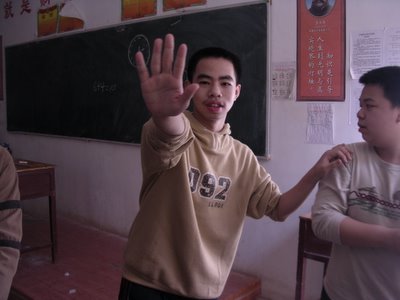
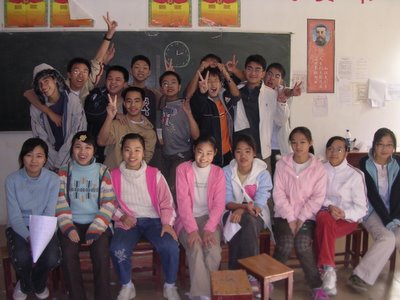
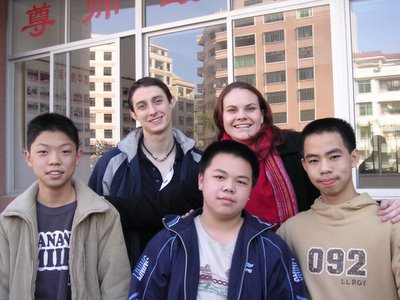
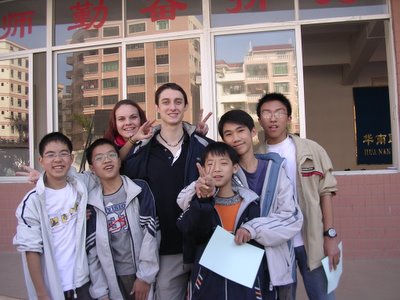
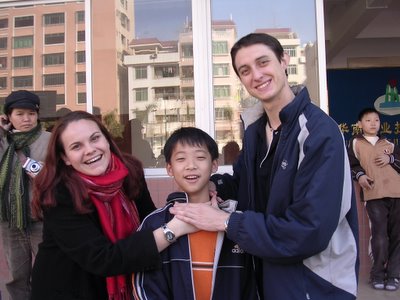
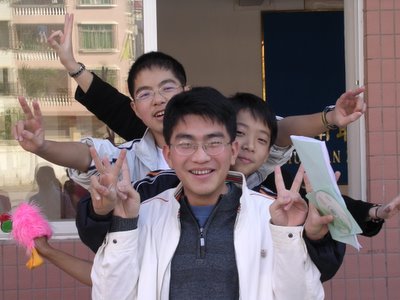
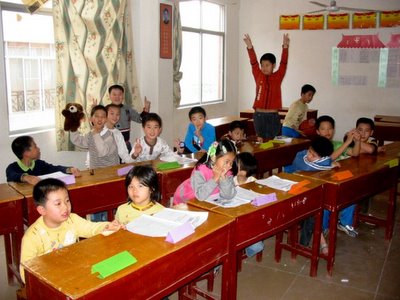
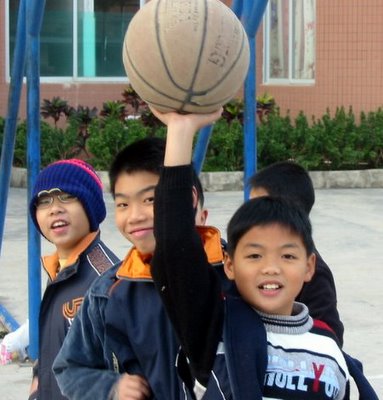
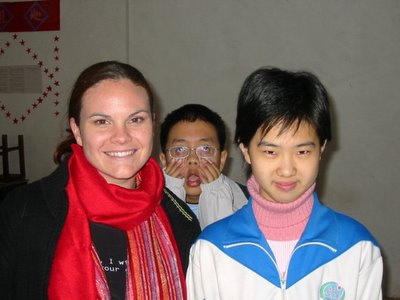
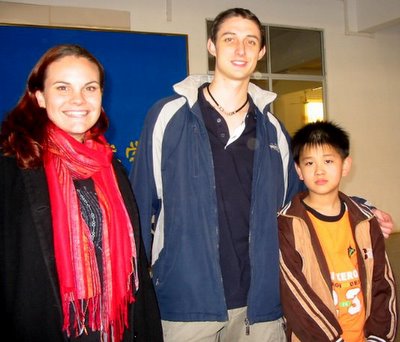



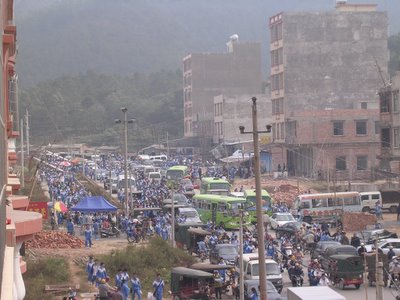
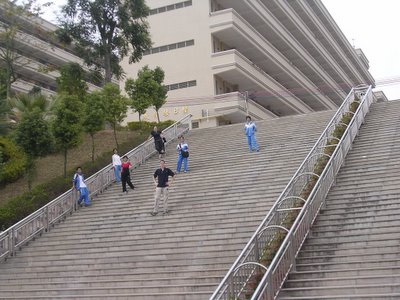
 China presents the visitor with a study in contrasts. Modernity and backwardness clash and mix in a thousand ways. The country still shrouded in mystery and intrigue fascinated me. From the austere political center of Beijing to the burgeoning "free market" glitter of Shanghai, I was struck by the vast contradictions of present-day life in China.
China presents the visitor with a study in contrasts. Modernity and backwardness clash and mix in a thousand ways. The country still shrouded in mystery and intrigue fascinated me. From the austere political center of Beijing to the burgeoning "free market" glitter of Shanghai, I was struck by the vast contradictions of present-day life in China. According to government statistics, 150 million peasants are considered to be "surplus" labor. The stream from the countryside to the urban centers has become a flood. More than 100 million workers have come from the countryside into China's cities in search of more lucrative work. These workers are hired on a short-term basis, most frequently as day laborers in construction. Because they are not officially residents of the cities they are living in, they are not entitled to housing or social services. They tend to camp out wherever they can find shelter. The government officials look upon them as a dangerous necessity--a source of cheap labor but also the source of future political unrest.
According to government statistics, 150 million peasants are considered to be "surplus" labor. The stream from the countryside to the urban centers has become a flood. More than 100 million workers have come from the countryside into China's cities in search of more lucrative work. These workers are hired on a short-term basis, most frequently as day laborers in construction. Because they are not officially residents of the cities they are living in, they are not entitled to housing or social services. They tend to camp out wherever they can find shelter. The government officials look upon them as a dangerous necessity--a source of cheap labor but also the source of future political unrest. In contrast, there are massive construction sites in downtown Beijing and Shanghai where spectacular luxury hotels and office buildings are mushrooming. It is common to see laborers as late as eleven o'clock at night working on the construction sites. Most of this construction is organized through joint venture projects. The materials and equipment used on these sites, not to mention the finished structures, appear technologically far superior to that used for housing the majority of the populace. The opulence of the five-star Great Wall Hotel in Beijing owned by Sheraton stands in sharp contrast to the conditions of most working people, including professional workers such as university professors. The restroom area, furnished with elegant couches and chairs, was larger and nicer than the living space of many millions.
In contrast, there are massive construction sites in downtown Beijing and Shanghai where spectacular luxury hotels and office buildings are mushrooming. It is common to see laborers as late as eleven o'clock at night working on the construction sites. Most of this construction is organized through joint venture projects. The materials and equipment used on these sites, not to mention the finished structures, appear technologically far superior to that used for housing the majority of the populace. The opulence of the five-star Great Wall Hotel in Beijing owned by Sheraton stands in sharp contrast to the conditions of most working people, including professional workers such as university professors. The restroom area, furnished with elegant couches and chairs, was larger and nicer than the living space of many millions. While the "glitz" of popular American culture is used to tease the masses into believing in the wonders of the "free market," or perhaps used to lull them to sleep, the government is preparing to bring the hammer down. The reality of the capitalist market will be the elimination of millions of jobs.
While the "glitz" of popular American culture is used to tease the masses into believing in the wonders of the "free market," or perhaps used to lull them to sleep, the government is preparing to bring the hammer down. The reality of the capitalist market will be the elimination of millions of jobs.
